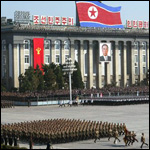Neil MacFarquhar, The New York Times
 The Security Council’s five permanent members agreed on Wednesday on a draft resolution that would ratchet up sanctions against North Korea by concentrating on its financial transactions and its arms industry, including allowing for inspections of its cargo vessels on the high seas.
The sharply worded resolution, while diluting some of the sanctions sought by the West and Japan, would still serve notice on North Korea that its nuclear and other weapons programs had created sufficient alarm to forge a rare unified front among the world’s major powers.
Hui Zhang, Bulletin of the Atomic Scientists
On the morning of May 25, many schools in northeast China were evacuated because of the earthquake caused by the North Korea nuclear test. The epicenter of the earthquake, registering 4.5 on the Richter scale, was just 180 kilometers away from those schools.
Daniel Dombey, Financial Times
Editor's Note: There has been much speculation that the possible June 12 election of a new, "reformist" president in Iran – therefore unseating incumbent President Mahmoud Ahmadinejad – could lead the way to resolving the Iranian nuclear dispute. While a new president may set a relatively softer tone toward the U.S., Iran's nuclear work will likely go unabated absent a proposal that sharply deviates from Supreme Leader Ali Khamenei, who is believed to have final say on the country's nuclear policy. Interestingly, according to the Institute for Science and International Security, even presidential hopeful Mir Hossein Mousavi, who is widely viewed as Ahmadinejad's biggest contender, played a role in the development of Iran's uranium enrichment program in the 1980s. Indeed, IAEA reports indicate that in 1987 it was then-Prime Minister Mousavi who effectively approved Iran's use of the A.Q. Khan network to secretly acquire centrifuge technology.
One of the most senior Democrats in Washington has dismissed a key element in the west’s long standing strategy on Iran’s nuclear programme as “ridiculous”. His comments throw open the debate about how far the US and its partners should go in seeking a compromise with Tehran after on Friday’s presidential election.
RIA Novosti
Russia's strategic nuclear forces need at least 1,500 nuclear warheads, and this must be taken into account in a new strategic arms deal, the commander of the Strategic Missile Forces said on Wednesday.
Dusan Stojanovic, Associated Press
Russia agreed Wednesday to take 3 metric tons of spent fuel from a closed Serbian nuclear reactor to ensure the radioactive waste does not end up in terrorist hands, officials said.
|